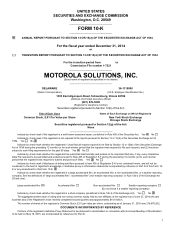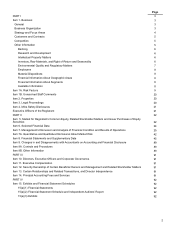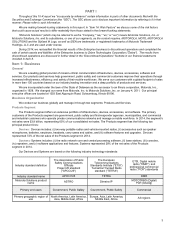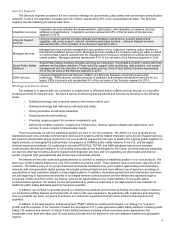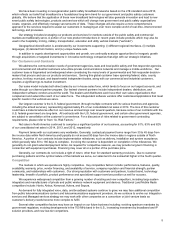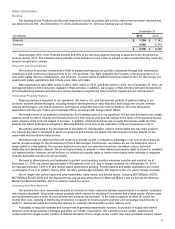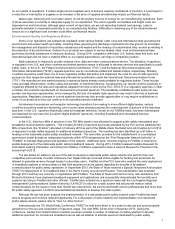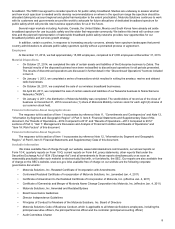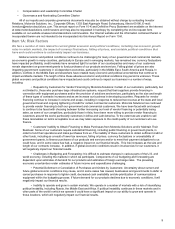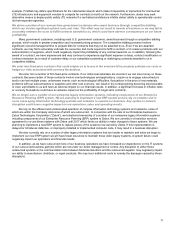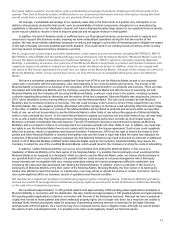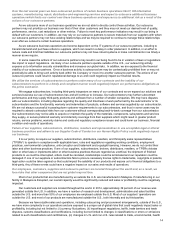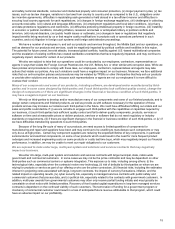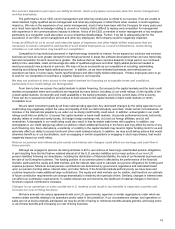Motorola 2014 Annual Report Download - page 12
Download and view the complete annual report
Please find page 12 of the 2014 Motorola annual report below. You can navigate through the pages in the report by either clicking on the pages listed below, or by using the keyword search tool below to find specific information within the annual report.10
A significant amount of our international business is transacted in local currency and a significant percentage of our
cash and cash equivalents are held outside of the United States, which exposes us to risk relating to currency
fluctuations, changes in foreign exchange regulations and repatriation delays and costs, which could negatively impact
our sales, profitability and financial flexibility.
We have sizable sales and operations in Canada and our Europe and Africa, Asia and Middle East, and Latin America
regions. A significant amount of this business is transacted in local currency. As a result, our financial performance is impacted
by currency fluctuations. We are also experiencing increased pressure to agree to established currency conversion rates and
cost of living adjustments as a result of foreign currency fluctuations.
A significant percentage of our cash and cash equivalents is currently held outside the U.S. and we continue to generate
profits outside of the U.S., while many of our liabilities, such as our public debt, the majority of our pension liabilities and certain
other cash payments, such as dividends and share repurchases, are payable in the U.S. While we have regularly repatriated
funds with minimal adverse financial impact, repatriation of some of the funds has been and could continue to be subject to
delay for local country approvals and could have potential adverse tax consequences. In addition, foreign exchange regulations
may limit our ability to convert or repatriate foreign currency. As a result of having a lower amount of cash and cash equivalents
in the U.S., our financial flexibility may be reduced.
A portion of our business is dependent upon U.S. government contracts and grants, which are highly regulated and
subject to oversight audits by U.S. government representatives and subject to cancellations. Such audits could result
in adverse findings and negatively impact our business.
Our U.S. government business is subject to specific procurement regulations with numerous compliance requirements.
These requirements, although customary in U.S. government contracting, increase our performance and compliance costs.
These costs may increase in the future, thereby reducing our margins, which could have an adverse effect on our financial
condition. Failure to comply with these regulations could lead to suspension or debarment from U.S. government contracting or
subcontracting for a period of time, and the inability to receive future grants. Among the causes for debarment are violations of
various laws or policies, including those related to procurement integrity, export control, U.S. government security regulations,
employment practices, protection of criminal justice data, protection of the environment, accuracy of records, proper recording of
costs, foreign corruption and the False Claims Act.
Generally, U.S. government contracts and grants are subject to oversight audits by U.S. government representatives. Such
audits could result in adjustments to our contracts or grants. Any costs found to be improperly allocated to a specific contract or
grant may not be allowed, and such costs already reimbursed may have to be refunded. Future audits and adjustments, if
required, may materially reduce our revenues or profits upon completion and final negotiation of audits. Negative audit findings
could also result in investigations, termination of a contract or grant, forfeiture of profits or reimbursements, suspension of
payments, fines and suspension or prohibition from doing business with the U.S. government. All contracts with the U.S.
government are subject to cancellation at the convenience of the U.S. government.
In addition, contacts with government officials and participation in political activities are areas that are tightly controlled by
federal, state, local and international laws. Failure to comply with these laws could cost us opportunities to seek certain
government sales opportunities or even result in fines, prosecution, or debarment.
Government regulation of radio frequencies may limit the growth of public safety broadband systems or reduce
barriers to entry for new competitors.
Radio frequencies are required to provide wireless services. The allocation of frequencies is regulated in the U.S. and
other countries and limited spectrum space is allocated to wireless services and specifically to public safety users. The growth of
public safety broadband communications systems may be affected: (i) by regulations relating to the access to allocated
spectrum for public safety users, (ii) if adequate frequencies are not allocated, or (iii) if new technologies are not developed to
better utilize the frequencies currently allocated for such use. Industry growth may also be affected by new licensing fees
required to use frequencies.
The U.S. leads the world in allocating spectrum to enable wireless communications including LTE. Other countries have
also allocated spectrum to allow deployment of these and other technologies. This changing landscape may introduce new
competition and new opportunities for us.
The Middle Class Tax Relief and Job Creation Act of 2012 (the “Legislation”) authorized an additional ten MHz of
broadband spectrum for public safety use for a total of 20 MHz of broadband spectrum for public safety. In addition, public safety
retained 14 MHz of the 700 MHz narrowband spectrum, subject to the FCC's authority to determine whether such spectrum
should be authorized for future broadband use. The Legislation further provides for the establishment of a centralized
governance model through an independent authority within NTIA designated as the “First-Responder Network Authority” or
“FirstNet” but allows for states to opt out of the plan to develop a nationwide public safety network and perform their own
competitive procurements if certain criteria are met. States that opt out would still be eligible for funding and would also be
allowed to generate revenue through leases to secondary users.
Although the Legislation has been enacted, the implementation of a nationwide public safety network under FirstNet has
been slow to progress and could be reduced significantly in scope due to: (i) complexities in the acquisition of a nationwide
network, which involves regulatory requirements, (ii) writing of the specifications and statement of work, (iii) decision making on
the system architecture or (iv) potential political opposition from certain states. Any such delays or changes in scope of the
FirstNet initiative could negatively impact our ability to further develop and expand our public safety LTE business in the U.S. For



